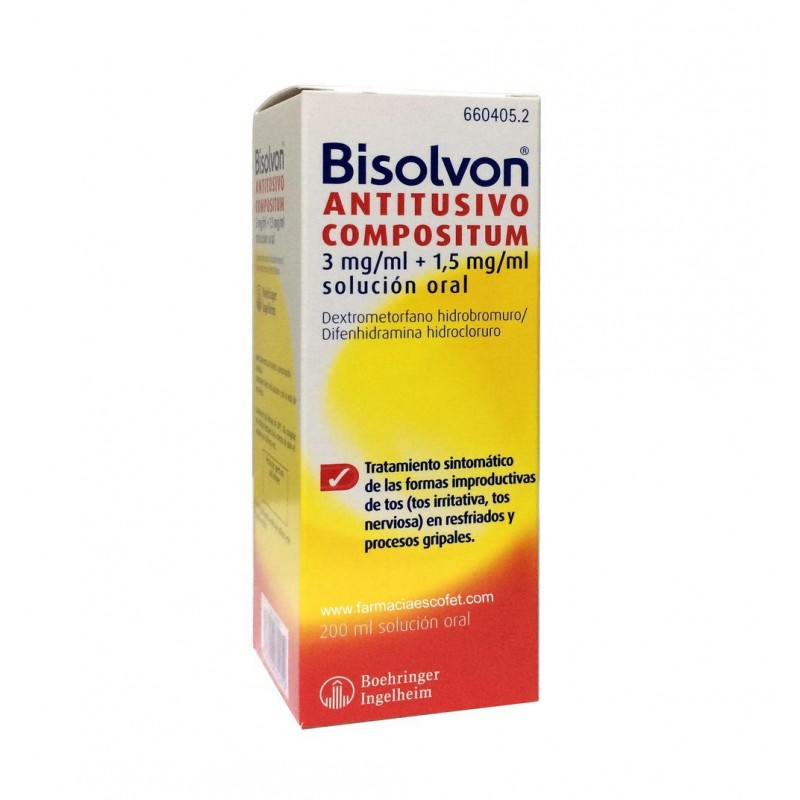



Symptomatic treatment of dry irritative cough or nervous (which is not accompanied by expectoration) in cold and flu.
What Bisolvon Antitusivo Compositum is and what it is used for
It is an antitussive medicine.
It is indicated for the symptomatic treatment of cough forms that are not accompanied by expectoration (irritative cough, nervous cough) in colds and flu processes in adults and children over 6 years of age.
You should see a doctor if it worsens or does not improve after 5 days of treatment.
How to take Bisolvon Antitusivo Compositum
Always take this medicine exactly as described in this leaflet or as your doctor or pharmacist has told you. If in doubt ask your doctor or pharmacist.
It is recommended to take this medicine with food and drink plenty of water during treatment.
The recommended dose is:
Adults and adolescents from 12 years:
Take a 5 ml measurement every 4 to 8 hours. Maximum daily: 120 mg dextromethorphan hydrobromide and 60 mg diphenhydramine hydrochloride (40 ml). Do not exceed 6 daily intakes.
Use in children
Children between 6 and 11 years old:
Take a 2.5 ml measurement every 4 to 8 hours. Maximum daily: 60 mg dextromethorphan hydrobromide and 30 mg diphenhydramine hydrochloride (20 ml). Do not exceed 6 daily intakes.
Serious side effects can occur in children in case of overdose, including neurological disturbances. Caregivers should not exceed the recommended dose.
Children under 6 years:
This medication is contraindicated in children younger than 6 years.
How to drink:
Bisolvon Antitusivo Compositum is administered orally using the included dosing cup.
If the cough worsens, persists for more than 5 days, or is accompanied by a high fever, skin rash, or persistent headache, you should see a doctor.
The duration of treatment should not exceed 5 days without medical supervision.
If you take more Bisolvon Antitussive Compositum than you should
Due to dextromethorphan:
If an overdose has been taken, the most frequent signs, especially in children and adolescents or in cases of abuse, are: nausea, vomiting and gastrointestinal disorders, dizziness, fatigue, drowsiness and hallucinations. Restlessness and excitability that with increased overdose can trigger agitation.
In addition, symptoms such as impaired concentration and loss of consciousness, coma (in cases of severe intoxication), changes in mood, psychotic disorders such as disorientation and delusions to confused or paranoid states, increased muscle tone, may also appear. ataxia (uncoordinated movements), dysarthria, nystagmus (uncontrolled and involuntary movement of the eyes) and impaired vision as well as respiratory depression, hypertension or hypotension (high or low blood pressure) and tachycardia (acceleration of the heartbeat).
It can also increase serotonin syndrome.
Cases of overdose death have been reported when taking dextromethorphan with other drugs (combined intoxication).
If you take more Bisolvon Antitussive Compositum than directed, you may experience the following symptoms: nausea and vomiting, involuntary muscle contractions, agitation, confusion, drowsiness, disorders of consciousness, involuntary and rapid eye movements, cardiac disorders (acceleration of heart rhythm), coordination disorders, psychosis with visual hallucinations and hyperexcitability.
Other symptoms in case of massive overdose can be: coma, severe respiratory problems and seizures.
Contact your doctor or hospital immediately if you experience any of the above symptoms.
Due to diphenhydramine:
If an overdose has been taken, the signs are dry membranes, urinary retention, reduced peristalsis, mydriasis (dilatation of the pupil of the eye), redness of the eye, hyperthermia, drowsiness, tachycardia, hallucinations, and seizures.
Symptoms of depression and stimulation of the central nervous system and hypotension have also been described.
Accidental taking of very high doses may produce aggravated symptoms in children compared to the symptoms described above.
In case of overdose or accidental ingestion, see your doctor or call the Toxicology Information Service (phone: 91.5620420), indicating the medicine and the amount ingested.
If you forget to take Bisolvon Antitussive Compositum
Do not take a double dose to make up for a forgotten dose.